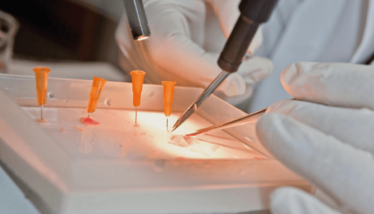Preventing Preterm Problems
Researchers explore the use of small molecules to reduce the risk of preterm birth

This article is part of our special focus on "traditional" pharma: The Small Molecule Manufacturer (read more here). You can find more articles from The Small Manufacturer here.

Researchers testing candidate drugs on small pieces of donated uterine tissue.
Birth before 37 weeks of gestation accounts for 15 million deaths each year, but tocolytics – the drugs used to suppress labor – have limited use. “Currently there are no FDA-approved drugs that reliably halt spontaneous preterm labor (sPTL) – none of the most commonly used tocolytics can delay preterm birth beyond 48-hours,” says Scott Barnett, a researcher at the University of Nevada’s Reno School of Medicine. “This short reprieve, at best provides, a limited window to administer corticosteroids to help develop the infant’s lungs prior to birth.”
And so, with the aim of providing pregnant women with a more effective range of safe medicines, the Iain L.O. Buxton research group, of which Barnett is a senior postdoctoral fellow, has characterized a molecular pathway that contributes to the phenomenon of sPTL, and identified four drugs with the potential to prevent it (1).
Specifically, the team has been investigating the unique pathophysiology of uterine smooth muscle that involves the metabolic dysregulation of nitric oxide – an endogenous smooth muscle-relaxing agent. It was once thought that direct administration of nitric oxide would help halt sPTL, but this route of administration was shown to be ineffective due to the overexpression of S-nitrosoglutathione reductase (GSNOR), an enzyme that metabolizes nitric oxide in women who experience sPTL (2).
“We discovered that GSNOR was overexpressed in some pregnant women, resulting in sPTL. With this information in hand, we identified and tested several GSNOR inhibitors on donated uterine tissue. When combined with an FDA-approved β3 agonist, nebivolol, and an experimental GSNOR inhibitor drug called N6022, the molecules prevented muscle contraction,” says Barnett. He believes that the pharmacological “one-two punch” helps increase the availability of nitric oxide in the uterine smooth muscle, making it less inclined to contract.
The researchers will now be working to develop additional small molecules that target the pathway of interest. They are also hoping to apply their work to CoV-2 infected uterine tissues; early data indicates that 40 percent of pregnancies in COVID-19 infected mothers are delivered preterm (3).
- SD Barnett et al., “Novel Drug Discovery Pathways in the Myometrium for the Treatment of Preterm Labor”, FASEB, (2020).
- SD Barnett et al., “S-Nitrosoglutathione Reductase Underlies the Dysfunctional Relaxation to Nitric Oxide in Preterm Labor”, Scientific Reports, 8,1, (2018)
- D Di Mascio et al., “Outcome of Coronavirus spectrum infections (SARS, MERS, COVID 1 -19) during pregnancy: a systematic review and meta-analysis”, Am J Obs Gynecol MFM, 25,2, (2020)
After finishing my degree, I envisioned a career in science communications. However, life took an unexpected turn and I ended up teaching abroad. Though the experience was amazing and I learned a great deal from it, I jumped at the opportunity to work for Texere. I'm excited to see where this new journey takes me!



















